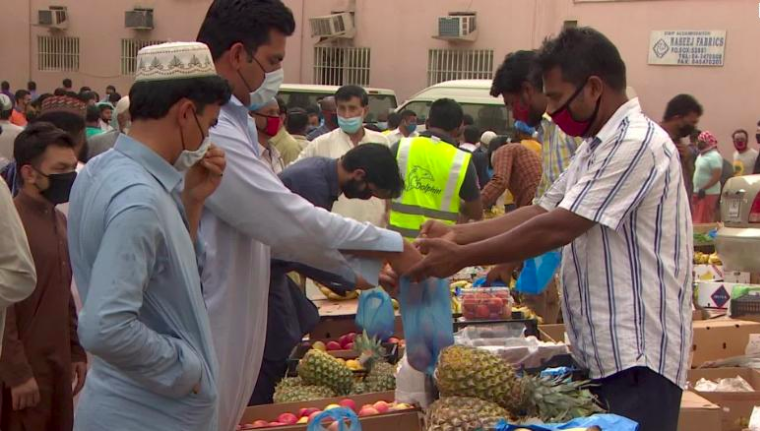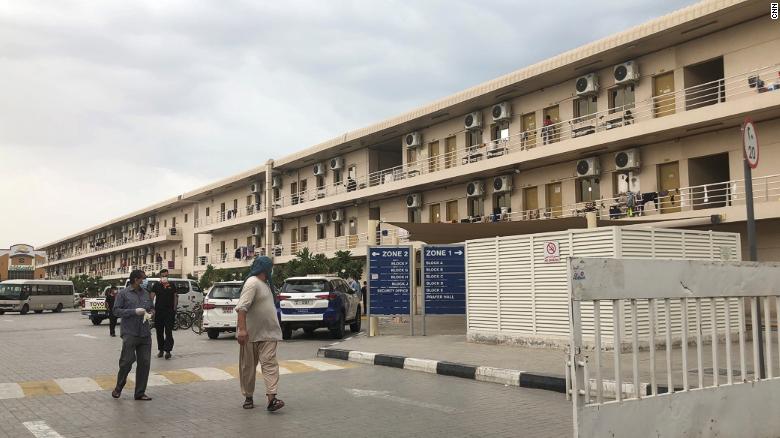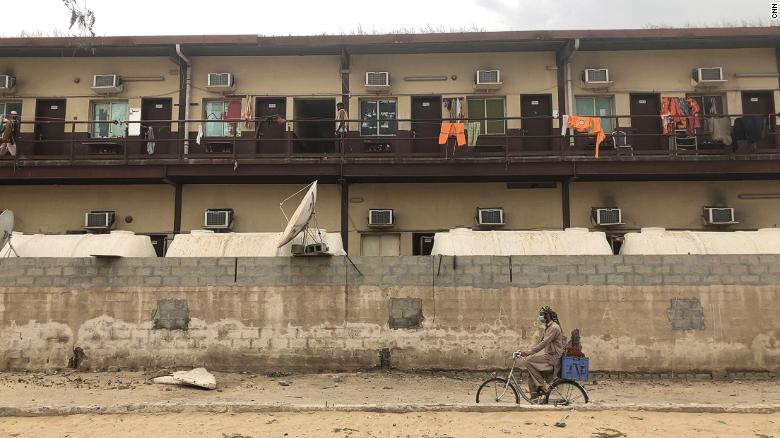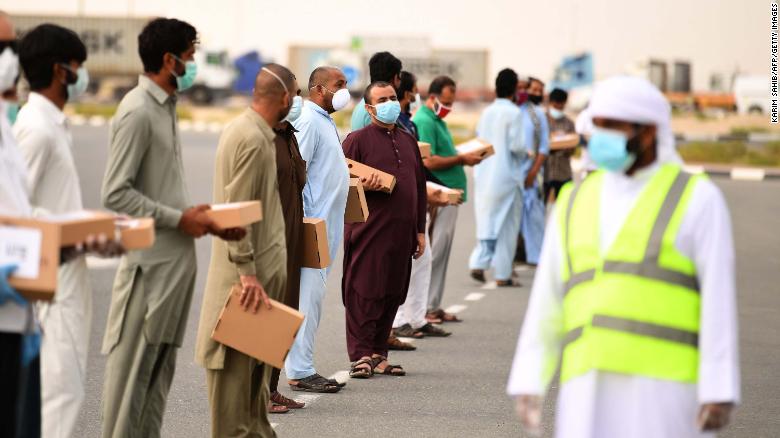By Sam Kiley and Mostafa Salem, CNN
Updated 1633 GMT (0033 HKT) May 9, 2020

Source: CNNIndia begins repatriating workers left stranded in the UAE 03:29
Dubai, United Arab Emirates (CNN)
Six Indian workers lie in bunk beds in the middle of a workday. Beyond the four walls of their small room in the United Arab Emirates, their options for maintaining a livelihood are becoming increasingly slim.
Two months ago, they were laid off as Covid-19’s spread dealt a blow to the UAE economy. Since then, they have been confined to their labor camp, surviving on a drip feed of monetary compensation.
Manjit Singh has worked in the UAE for 17 years, enduring tough living conditions to provide a lifeline for his impoverished family back home in India. After the coronavirus started to spread this year, his employer suspended operations, leaving him in limbo. Commercial flights in the UAE were grounded, India went into lockdown on March 24, and Singh stopped receiving an income.
Related stories
- Coronavirus pandemic could contribute to surge of other deadly diseases, experts warn
- The coronavirus is crushing India’s Bollywood, the world’s most prolific film industry
“For the past two months, we have been sitting in the room and our company was giving us a salary, but now they are saying that they cannot give us a salary and we should buy a ticket to go home, but where should we buy the ticket?” the 44-year-old told CNN.
Singh is one of hundreds of thousands of migrant workers across the Gulf’s Arab countries who are contending with stripped livelihoods, overcrowded camps and no easy path to repatriation, Amnesty International, Migrant-Rights.org and Business & Human Rights Resource Centre said.
Laborers are also especially vulnerable to the virus, these rights groups say, and the compounds they’re restricted to are considered hotbeds of the pandemic in the region.

With limited options for repatriation, and with no salary, hundreds of thousands of migrant workers in the Gulf are running out of options.
Slow repatriations
In one labor camp on the outskirts of Dubai, hundreds of recently unemployed workers spend their days walking around the yard with their friends concocting plans to go home.
“I have not received the salary for the previous month … they gave 150 Rupees (around $2) for food and told us to manage,” said one construction worker who CNN agreed to not identify due to his fear of punishment by his previous employer.
“We don’t have money to eat. Sometimes the company gives money. Sometimes they give a partial amount. Sometimes no money at all,” said one Indian worker who refused to be named.
With the little money they still have, the men buy vegetables at a makeshift market near their housing buildings. “The company is giving us one meal a day during Ramadan. But how can one manage with one meal?” said one construction worker, referring to the Muslim holy month of fasting.
Gulf countries say they are working to control the spread of the virus in these camps and neighborhoods while attending to the millions of workers who are now left unemployed and unsalaried.
Mysterious abandoned village becomes a lure for intrepid travelersOn May 3 in Kuwait, Egyptian migrant workers protested at a state shelter, demanding repatriation, Kuwait’s interior ministry said.
The Egyptian government has since said it will begin scheduling repatriation flights as early as this week.
The Indian government started a repatriation effort this week for thousands of “distressed’ Indians stuck abroad. Around 200,000 Indian nationals in the UAE have registered for repatriation, according to the Indian embassy, and so far more than 700 have been returned. Over 5,000 are set to be repatriated from the Gulf this week.
The embassy tweeted that Indians will foot the bill of their repatriation, presenting yet another obstacle to stranded migrant workers.
Some of the embassies representing the largely South and East Asian laborers in the UAE have repatriated a handful of the stranded nationals. The Philippines last month flew 494 nationals back to Manila.
Pakistan has evacuated 3,928 Pakistanis out of 60,000 who registered to return, according to the Pakistani consulate in Dubai.

The UAE’s labor compounds are considered hotbeds of the virus.
For decades, oil-rich Arab countries in the Gulf have relied heavily on millions of migrant laborers to build their vast economies. Workers flock to these countries in search of comparatively higher salaries and work opportunities.
In 2017 alone, migrants in Arab states sent home $124 billion, with the UAE and Saudi Arabia ranking second and third globally in terms of remittance outflow, according to the International Labour Organization.
Camps are coronavirus hotspots
As of Friday afternoon, the UAE had 16,793 confirmed cases of the virus and 174 deaths from the pandemic. Nearby Saudi Arabia has over 35,000 cases and 229 deaths. Kuwait has reported over 7,000 cases and 47 deaths while Qatar has 20,201 cases and 12 deaths.
As the coronavirus spread across the region, overcrowded labor camps and other densely populated neighborhoods have emerged as areas with elevated risk of the virus. Many workers are confined to small rooms which they typically share with up to 12 other people, according to Amnesty International. They also use communal bathrooms and kitchens which sometimes lack electricity and running water.
“Throughout the Gulf, Covid-19 is shining a spotlight on the unsanitary, overcrowded conditions many migrant workers live in, and their precarious legal status,” Amnesty International said in a statement last week.

Volunteers distribute Iftar meals to migrant workers keeping distance from each other during the Muslim holy month of Ramadan.
But Gulf governments say they are working to contain the spread of the virus in the labor compounds and have pressured governments to repatriate their citizens.
“There are measures in testing these labor camps, screening them and isolating those who are positive so there’s a lot of efforts across the government teams and the non-government teams to make sure of the well-being of the laborers and the labor camps and high-density areas in general,” said Amer Sharif, head of the Dubai Covid-19 command center.
With coronavirus-related pressures mounting on private businesses in the Gulf, governments have responded with economic stimulus packages and legislation to relieve unemployment. But these measures, rights groups argue, will do little to mitigate laborers’ hardships, Amnesty said.
For now, Singh only asks for the basics: his home and his salary. “If not, at least give us food. We will be happy with that too,” he says.
CNN’s Sarah El Sirgany, Zeena Saifi, Sanjiv Talreja and Manveena Suri contributed to this report.



コメント